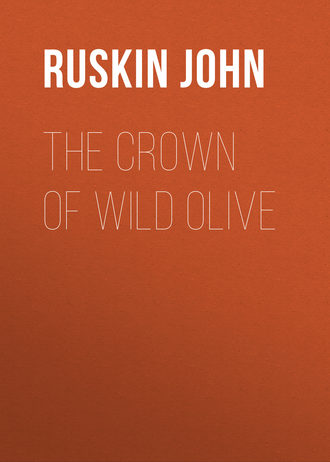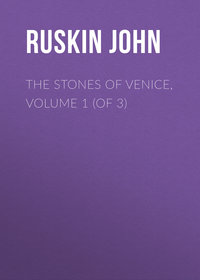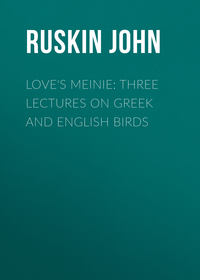 полная версия
полная версияThe Crown of Wild Olive
41
For example, suppose an active peasant, having got his ground into good order and built himself a comfortable house, finding time still on his hands, sees one of his neighbours little able to work, and ill-lodged, and offers to build him also a house, and to put his land in order, on condition of receiving for a given period rent for the building and tithe of the fruits. The offer is accepted, and a document given promissory of rent and tithe. This note is money. It can only be good money if the man who has incurred the debt so far recovers his strength as to be able to take advantage of the help he has received, and meet the demand of the note; if he lets his house fall to ruin, and his field to waste, his promissory note will soon be valueless: but the existence of the note at all is a consequence of his not having worked so stoutly as the other. Let him gain as much as to be able to pay back the entire debt; the note is cancelled, and we have two rich store-holders and no currency.
42
[You need not trouble yourself to make out the sentence in parenthesis, unless you like, but do not think it is mere metaphor. It states a fact which I could not have stated so shortly, but by metaphor.]
43
[What follows, to the end of the chapter, was a note only, in the first printing; but for after service, it is of more value than any other part of the book, so I have put it into the main text.]
44
I have repeated the substance of this and the next paragraph so often since, that I am ashamed and weary. The thing is too true, and too simple, it seems, for anybody ever to believe. Meantime, the theories of "international values," as explained by Modern Political Economy, have brought about last year's pillage of France by Germany, and the affectionate relations now existing in consequence between the inhabitants of the right and left banks of the Rhine.
45
I wish some one would examine and publish accurately the late dealings of the Governors of the Cape with the Caffirs.
46
By "pay," I mean wages for labour or skill; by "profit," gain dependent on the state of the market.
47
Since I wrote this, I have worked out the question of interest of money, which always, until lately, had embarrassed and defeated me; and I find that the payment of interest of any amount whatever is real "usury," and entirely unjustifiable. I was shown this chiefly by the pamphlets issued by Mr. W. C. Sillar, though I greatly regret the impatience which causes Mr. Sillar to regard usury as the radical crime in political economy. There are others worse, that act with it.
48
Hence Dante's companionship of Cahors, Inf., canto xi., supported by the view taken of the matter throughout the middle ages, in common with the Greeks.
49
I do not wonder when I re-read this, that people talk about my "sentiment." But there is no sentiment whatever in the matter. It is a hard and bare commercial fact, that if two people deal together who don't try to cheat each other, they will in a given time, make more money out of each other than if they do. See § 104.
50
Shakspeare would certainly never have chosen this name had he been forced to retain the Roman spelling. Like Perdita, "lost lady," or Cordelia, "heart-lady," Portia is "fortune" lady. The two great relative groups of words, Fortuna, fero, and fors—Portio, porto, and pars (with the lateral branch, op-portune, im-portune, opportunity, &c.), are of deep and intricate significance; their various senses of bringing, abstracting, and sustaining being all centralized by the wheel (which bears and moves at once), or still better, the ball (spera) of Fortune,—"Volve sua spera, e beata si gode:" the motive power of this wheel distinguishing its goddess from the fixed majesty of Necessitas with her iron nails; or ανανκη, with her pillar of fire and iridescent orbits, fixed at the centre. Portus and porta, and gate in its connexion with gain, form another interesting branch group; and Mors, the concentration of delaying, is always to be remembered with Fors, the concentration of bringing and bearing, passing on into Fortis and Fortitude.
[This note is literally a mere memorandum for the future work which I am now completing in Fors Clavigera; it was printed partly in vanity, but also with real desire to get people to share the interest I found in the careful study of the leading words in noble languages. Compare the next note.]
51
As Charis becomes Charitas, the word "Cher," or "Dear," passes from Shylock's sense of it (to buy cheap and sell dear) into Antonio's sense of it: emphasized with the final i in tender "Cheri," and hushed to English calmness in our noble "Cherish." The reader must not think that any care can be misspent in tracing the connexion and power of the words which we have to use in the sequel. (See Appendix VI.) Much education sums itself in making men economize their words, and understand them. Nor is it possible to estimate the harm which has been done, in matters of higher speculation and conduct, by loose verbiage, though we may guess at it by observing the dislike which people show to having anything about their religion said to them in simple words, because then they understand it. Thus congregations meet weekly to invoke the influence of a Spirit of Life and Truth; yet if any part of that character were intelligibly expressed to them by the formulas of the service, they would be offended. Suppose, for instance, in the closing benediction, the clergyman were to give vital significance to the vague word "Holy," and were to say, "the fellowship of the Helpful and Honest Ghost be with you, and remain with you always," what would be the horror of many, first at the irreverence of so intelligible an expression; and secondly, at the discomfortable occurrence of the suspicion that while throughout the commercial dealings of the week they had denied the propriety of Help, and possibility of Honesty, the Person whose company they had been now asking to be blessed with could have no fellowship with cruel people or knaves.
52
"τα μεν ουν αγγα ζωα ουκ εχειν αισθησιν των εν ταις κινησεσι ταξεων ουδε αταξιων οις δη ρυθμος υνομα και ἁομονια ημιν δε ους ειπομεν τους Θεους (Apollo, the Muses, and Bacchus—the grave Bacchus, that is—ruling the choir of age; or Bacchus restraining; 'sæva tene, cum Berecyntio cornu tympana,' &c.) συνχορευτας δεδοσθαι, τουτους ειναι και τους δεδωκοτας την ενρυθμον τε και εναρμονιον αισθησιν μεθ' ηδονης … χορους τε ωνομακεναι παρα της χαρας εμφυτον ονομα." "Other animals have no perception of order nor of disorder in motion; but for us, Apollo and Bacchus and the Muses are appointed to mingle in our dances; and there are they who have given us the sense of delight in rhythm and harmony. And the name of choir, choral dance, (we may believe,) came from chara (delight)."—Laws, book ii.
53
[My way now, is to say things plainly, if I can, whether they sound harsh or not;—this is the translation—"Is it possible, then, that as a horse is only a mischief to any one who attempts to use him without knowing how, so also our brother, if we attempt to use him without knowing how, may be a mischief to us?"]
54
[Think over this paragraph carefully; it should have been much expanded to be quite intelligible; but it contains all that I want it to contain.]
55
"The ordinary brute, who flourishes in the very centre of ornate life, tells us of unknown depths on the verge of which we totter, being bound to thank our stars every day we live that there is not a general outbreak, and a revolt from the yoke of civilization."—Times leader, Dec. 25, 1862. Admitting that our stars are to be thanked for our safety, whom are we to thank for the danger?
56
Our politicians, even the best of them, regard only the distress caused by the failure of mechanical labour. The degradation caused by its excess is a far more serious subject of thought, and of future fear. I shall examine this part of our subject at length hereafter. There can hardly be any doubt, at present, cast on the truth of the above passages, as all the great thinkers are unanimous on the matter. Plato's words are terrific in their scorn and pity whenever he touches on the mechanical arts. He calls the men employed in them not even human, but partially and diminutively human, "ανθρωπισκοι," and opposes such work to noble occupations, not merely as prison is opposed to freedom but as a convict's dishonoured prison is to the temple (escape from them being like that of a criminal to the sanctuary); and the destruction caused by them being of soul no less than body.—Rep. vi. 9. Compare Laws, v. 11. Xenophon dwells on the evil of occupations at the furnace and especially their "ασχολια, want of leisure."—Econ. i. 4. (Modern England, with all its pride of education, has lost that first sense of the word "school;" and till it recover that, it will find no other rightly.) His word for the harm to the soul is to "break" it, as we say of the heart.—Econ. i. 6. And herein, also, is the root of the scorn, otherwise apparently most strange and cruel, with which Homer, Dante, and Shakspeare always speak of the populace; for it is entirely true that, in great states, the lower orders are low by nature as well as by task, being precisely that part of the commonwealth which has been thrust down for its coarseness or unworthiness (by coarseness I mean especially insensibility and irreverence—the "profane" of Horace); and when this ceases to be so, and the corruption and profanity are in the higher instead of the lower orders, there arises, first, helpless confusion, then, if the lower classes deserve power, ensues swift revolution, and they get it; but if neither the populace nor their rulers deserve it, there follows mere darkness and dissolution, till, out of the putrid elements, some new capacity of order rises, like grass on a grave; if not, there is no more hope, nor shadow of turning, for that nation. Atropos has her way with it.
So that the law of national health is like that of a great lake or sea, in perfect but slow circulation, letting the dregs fall continually to the lowest place, and the clear water rise; yet so as that there shall be no neglect of the lower orders, but perfect supervision and sympathy, so that if one member suffer, all members shall suffer with it.
57
"ολιγης, και αλλως γιγνομενης." (Little, and that little born in vain.) The bitter sentence never was so true as at this day.
58
[This following note is a mere cluster of memoranda, but I keep it for reference.] Thetic, or Thesmic, would perhaps be a better term than archic; but liable to be confused with some which we shall want relating to Theoria. The administrators of the three great divisions of law are severally Archons, Merists, and Dicasts. The Archons are the true princes, or beginners of things; or leaders (as of an orchestra). The Merists are properly the Domini, or Lords of houses and nations. The Dicasts, properly, the judges, and that with Olympian justice, which reaches to heaven and hell. The violation of archic law is ἁμαρτια (error), πονηρια (failure), or πλημμελεια (discord). The violation of meristic law is ανομια (iniquity). The violation of critic law is αδικια (injury). Iniquity is the central generic term; for all law is fatal; it is the division to men of their fate; as the fold of their pasture, it is νομος; as the assigning of their portion, μοιρα.
59
[This is the only sentence which, in revising these essays, I am now inclined to question; but the point is one of extreme difficulty. There might be a law, for instance, of curfew, that candles should be put out, unless for necessary service, at such and such an hour, the idea of "necessary service" being quite indefinable, and no penalty possible; yet there would be a distinct consciousness of illegal conduct in young ladies' minds who danced by candlelight till dawn.]
60
[Read this and the next paragraph with attention; they contain clear statements, which I cannot mend, of things most necessary.]
61
[Mainly; not altogether. Conclusive reward of high virtue is loving and crowning, not helping; and conclusive punishment of deep vice is hating and crushing, not merely hindering.]
62
Compare Chaucer's "villany" (clownishness).
Full foul and chorlishe seemed she,And eke villanous for to be,And little coulde of nortureTo worship any creature.63
[I leave this paragraph, in every syllable, as it was written, during the rage of the American war; it was meant to refer, however, chiefly to the Northerns: what modifications its hot and partial terms require I will give in another place: let it stand now as it stood.]
64
Supply and demand! Alas! for what noble work was there ever any audible "demand" in that poor sense (Past and Present)? Nay, the demand is not loud, even for ignoble work. See "Average Earnings of Betty Taylor," in Times of 4th February of this year [1863]: "Worked from Monday morning at 8 a.m. to Friday night at 5.30 p.m. for 1s. 5-1/2d."—Laissez faire. [This kind of slavery finds no Abolitionists that I hear of.]
65
["That the sacred grove is nothing but logs."]
66
Ames, by report of Waldo Emerson, says "that a monarchy is a merchantman, which sails well, but will sometimes strike on a rock, and go to the bottom; whilst a republic is a raft, which would never sink, but then your feet are always in the water." Yes, that is comfortable; and though your raft cannot sink (being too worthless for that), it may go to pieces, I suppose, when the four winds (your only pilots) steer competitively from its four corners, and carry it, ως οπωρινος Βορεης φορεησιν ακανθας, and then more than your feet will be in the water.
67
["Not with water, but with ruin." The worst ruin being that which the Americans chiefly boast of. They sent all their best and honestest youths, Harvard University men and the like, to that accursed war; got them nearly all shot; wrote pretty biographies (to the ages of 17, 18, 19) and epitaphs for them; and so, having washed all the salt out of the nation in blood, left themselves to putrefaction, and the morality of New York.]
68
[This paragraph contains the gist of all that precede.]
69
[Whenever you are puzzled by any apparently mistaken use of words in these essays, take your dictionary, remembering I had to fix terms, as well as principles. A Duke is a "dux" or "leader;" the flying wedge of cranes is under a "ducal monarch"—a very different personage from a queen bee. The Venetians, with a beautiful instinct, gave the name to their King of the Sea.]
70
[This is a perfect picture of the French under the tyrannies of their Pelican Kings, before the Revolution. But they must find other than Pelican Kings—or rather, Pelican Kings of the Divine brood, that feed their children, and with their best blood.]
71
[Read carefully, from this point; because here begins the statement of things requiring to be done, which I am now re-trying to make definite in Fors Clavigera.]
72
["Evil on the top of Evil." Delphic oracle, meaning iron on the anvil.]
73
[Permit me to enforce and reinforce this statement, with all earnestness. It is the sum of what needs most to be understood in the matter of education.]
74
[A pregnant paragraph, meant against English and Scotch landlords who drive their people off the land.]
75
[In Lucian's dialogue, "The sale of lives."]
76
[I raise this analysis of the Tempest into my text; but it is nothing but a hurried note, which I may never have time to expand. I have retouched it here and there a little, however.]
77
Of Shakspeare's names I will afterwards speak at more length; they are curiously—often barbarously—much by Providence,—but assuredly not without Shakspeare's cunning purpose—mixed out of the various traditions he confusedly adopted, and languages which he imperfectly knew. Three of the clearest in meaning have been already noticed. Desdemona, "δυσδαιμονια," "miserable fortune," is also plain enough. Othello is, I believe, "the careful;" all the calamity of the tragedy arising from the single flaw and error in his magnificently collected strength. Ophelia, "serviceableness," the true lost wife of Hamlet, is marked as having a Greek name by that of her brother, Laertes; and its signification is once exquisitely alluded to in that brother's last word of her, where her gentle preciousness is opposed to the uselessness of the churlish clergy—"A ministering angel shall my sister be, when thou liest howling." Hamlet is, I believe, connected in some way with "homely" the entire event of the tragedy turning on betrayal of home duty. Hermione (ερμα), "pillar-like," (ἡ ειδος εχε χρυσης 'ἡειδος Αφροδιτης). Titania (τιτηνη), "the queen;" Benedict and Beatrice, "blessed and blessing;" Valentine and Proteus, enduring (or strong), (valens), and changeful. Iago and Iachimo have evidently the same root—probably the Spanish Iago, Jacob, "the supplanter," Leonatus, and other such names, are interpreted, or played with, in the plays themselves. For the interpretation of Sycorax, and reference to her raven's feather, I am indebted to Mr. John R. Wise.
78
In the present general examination, I concede so much to ordinary economists as to ignore all innocent poverty. I adapt my reasoning, for once, to the modern English practical mind, by assuming poverty to be always criminal; the conceivable exceptions we will examine afterwards.
79
[I have no terms of English, and can find none in Greek nor Latin, nor in any other strong language known to me, contemptuous enough to attach to the bestial idiotism of the modern theory that wages are to be measured by competition.]
80
I say nothing yet of the quality of the servants, which, nevertheless, is the gist of the business. Will you have Paul Veronese to paint your ceiling, or the plumber from over the way? Both will work for the same money; Paul, if anything, a little the cheaper of the two, if you keep him in good humour; only you have to discern him first, which will need eyes.
81
[I have not altered a syllable in these three paragraphs, 137, 138, 139, on revision; but have much italicised: the principles stated being as vital, as they are little known.]
82
By his art he may; but only when its produce, or the sight or hearing of it, becomes a subject of dispute, so as to enable the artist to tax the labour of multitudes highly, in exchange for his own.
83
[Observe this; the legal right to keep what you have worked for, and use it as you please, is the corner-stone of all economy: compare the end of Chap. II.]
84
[I should now put the time of necessary labour rather under than over the third of the day.]
85
[See Preface to Unto this Last.]
86
I have not hitherto touched on the subject of interest of money; it is too complex, and must be reserved for its proper place in the body of the work. The definition of interest (apart from compensation for risk) is, "the exponent of the comfort of accomplished labour, separated from its power;" the power being what is lent: and the French economists who have maintained the entire illegality of interest are wrong; yet by no means so curiously or wildly wrong as the English and French ones opposed to them, whose opinions have been collected by Dr. Whewell at page 41 of his Lectures; it never seeming to occur to the mind of the compiler, any more than to the writers whom he quotes, that it is quite possible, and even (according to Jewish proverb) prudent, for men to hoard as ants and mice do, for use, not usury; and lay by something for winter nights, in the expectation of rather sharing than lending the scrapings. My Savoyard squirrels would pass a pleasant time of it under the snow-laden pine branches, if they always declined to economize because no one would pay them interest on nuts.
[I leave this note as it stood: but, as I have above stated, should now side wholly with the French economists spoken of, in asserting the absolute illegality of interest.]
87
Compare Chaucer's feeling respecting birds (from Canace's falcon, to the nightingale, singing, "Domine, labia—" to the Lord of Love), with the usual modern British sentiments on this subject. Or even Cowley's:—
"What prince's choir of music can excelThat which within this shade does dwell,To which we nothing pay, or give,They, like all other poets, liveWithout reward, or thanks for their obliging pains!'Tis well if they become not prey."Yes; it Is better than well; particularly since the seed sown by the wayside has been protected by the peculiar appropriation of part of the church-rates in our country parishes. See the remonstrance from a "Country parson," in The Times of June 4th (or 5th; the letter is dated June 3rd,) 1862:—"I have heard at a vestry meeting a good deal of higgling over a few shillings' outlay in cleaning the church; but I have never heard any dissatisfaction expressed on account of that part of the rate which is invested in 50 or 100 dozens of birds' heads."
[If we could trace the innermost of all causes of modern war, I believe it would be found, not in the avarice nor ambition of nations, but in the mere idleness of the upper classes. They have nothing to do but to teach the peasantry to kill each other.]
88
[See the Life of Fenelon. "The labouring peasantry were at all times the objects of his tenderest care; his palace at Cambray, with all his books and writings, being consumed by fire, he bore the misfortune with unruffled calmness, and said it was better his palace should be burnt than the cottage of a poor peasant." (These thoroughly good men always go too far, and lose their power over the mass.) He died exemplifying the mean he had always observed between prodigality and avarice, leaving neither debts nor money.]
89
και πενιαν ἡγουμενους ειναι μη το την ουσιαν ελαττω ποιειν αλλα το τηι απληστιαν ρλειω. "And thinking (wisely) that poverty consists not in making one's possessions less, but one's avarice more."—Laws, v. 8. Read the context, and compare. "He who spends for all that is noble, and gains by nothing but what is just, will hardly be notably wealthy, or distressfully poor."—Laws, v. 42.
90
The fury of modern trade arises chiefly out of the possibility of making sudden fortunes by largeness of transaction, and accident of discovery or contrivance. I have no doubt that the final interest of every nation is to check the action of these commercial lotteries; and that all great accidental gains or losses should be national,—not individual. But speculation absolute, unconnected with commercial effort, is an unmitigated evil in a state, and the root of countless evils beside.
91
[I desire in the strongest terms to reinforce all that is contained in this paragraph.]









